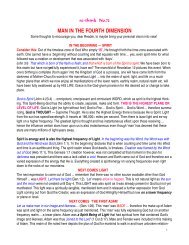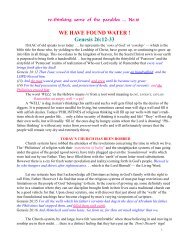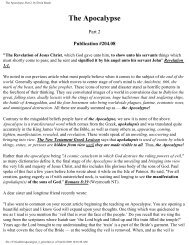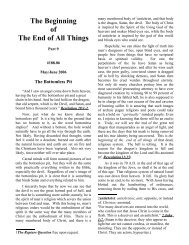Create successful ePaper yourself
Turn your PDF publications into a flip-book with our unique Google optimized e-Paper software.
LINCOLN THE UNKNOWN• 115Tales of sensuality so revolting that <strong>the</strong>y could not be reprintednow, were broadcast in Abolition pamphlets <strong>the</strong>n. Slaveownerswere accused of violating <strong>the</strong>ir own mulatto daughtersand selling <strong>the</strong>m to be <strong>the</strong> mistresses of o<strong>the</strong>r men.Stephen S. Foster declared that <strong>the</strong> Methodist Church in <strong>the</strong>South had fifty thousand black female members who were forcedwith whips to lead immoral lives, and he declared that <strong>the</strong> solereason why Methodist preachers of that region favored slaverywas because <strong>the</strong>y wanted concubines for <strong>the</strong>mselves.<strong>Lincoln</strong> himself, during his debates with Douglas, declaredthat in 1850 <strong>the</strong>re were 405,751 mulattoes in <strong>the</strong> United States,and that nearly all had sprung from black slaves and whitemasters.Because <strong>the</strong> Constitution protected <strong>the</strong> rights of slave-owners,<strong>the</strong> Abolitionists cursed it as "a covenant with death and anagreement with hell."As a climax to all Abolition literature, <strong>the</strong> wife of a povertystrickenprofessor of <strong>the</strong>ology sat down at her dining-room tableand wrote a book which she called "Uncle Tom's Cabin." Sobbingas she wrote, she told her story in a storm of feeling.Finally she said God was writing <strong>the</strong> story. It dramatized andmade real <strong>the</strong> tragedies of slavery as nothing else had everdone. It stirred <strong>the</strong> emotions of millions of readers and achieveda greater sale and exerted a more profound influence than anyo<strong>the</strong>r novel that has ever been written.When <strong>Lincoln</strong> was introduced to Harriet Beecher Stowe, <strong>the</strong>woman that started <strong>the</strong> big war.author, he called her <strong>the</strong> littleAnd what was <strong>the</strong> result of this well-meant but fanaticalcampaign of overstatement waged by <strong>the</strong> Abolitionists of <strong>the</strong>North? Did it convince <strong>the</strong> Sou<strong>the</strong>rners that <strong>the</strong>y were wrong?Far from it. The effect was such as might have been expected.The hatred stirred up by <strong>the</strong> Abolitionists did what hatredalways does: it bred hatred in return. It made <strong>the</strong> South wishto part company with its insolent, meddlesome critics. Truthseldom flourishes in an atmosphere of politics or of emotion,and on both sides of <strong>the</strong> Mason and Dixon's Line tragic errorhad grown to its bloody blossom time.When <strong>the</strong> "black Republicans" elected <strong>Lincoln</strong> in 1860, <strong>the</strong>Sou<strong>the</strong>rners were firmly convinced that slavery was doomed,and that <strong>the</strong>y had to choose at once between abolition and secession.So why not secede? Didn't <strong>the</strong>y have a right to?That question had been hotly debated back and forth for half
















